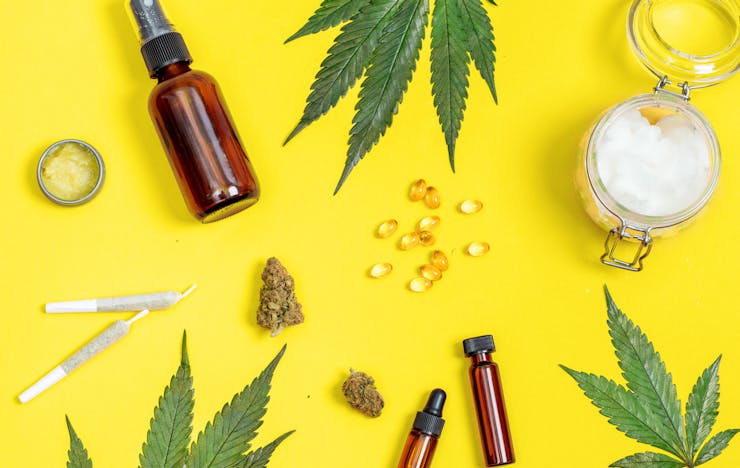Cannabidiol (CBD) is a naturally-occurring ingredient in both cannabis and its cousin, hemp. In medicine, it is used to treat a variety of symptoms and conditions, from epileptic seizures to chronic pain to insomnia and anxiety.
CBD is lauded for its ability to calm inflammation without creating an intoxicating high. No wonder, then, that it’s also an increasingly buzzy ingredient in health, wellness, and beauty products.
In its simplest form CBD is a molecule, and that molecule is the same regardless of whether it’s derived from cannabis or hemp. But not all CBD extraction methods are created equal, and not all hemp or cannabis products contain CBD.
Here to sort science from marketing, and the truth from misinformation, are the factors you should consider before buying a CBD—or so-called CBD—product.
Full spectrum, isolate, or broad spectrum
Full spectrum, broad spectrum, and isolate are common terms used to describe CBD and other cannabis products. Although they sound like marketing buzzwords, they represent real and important distinctions about the cannabinoid(s) inside.
Full-spectrum CBD
Full-spectrum products, sometimes called whole plant extracts, contain CBD as well as other ingredients extracted from the same plant matter. Full-spectrum CBD products are believed to benefit from the ‘entourage effect,’ a theory that the ingredients in cannabis work better together than in isolation.
Full-spectrum CBD products contain flavonoids and terpenes—ingredients that bring therapeutic benefits, along with scents and flavours—and may include other cannabinoids such as CBD, CBG, CBN, CBDa, THC, and THCa. Full-spectrum products are not recommended for people with THC sensitivity, as trace amounts of that cannabinoid may be present.
CBD isolate
CBD isolate is pure CBD, and is produced by removing all other compounds, including terpenes, flavonoids, and other cannabinoids. It usually comes in the form of an odourless, flavourless powder, and is often used in clinical trials.
While CBD isolate doesn’t offer the potential benefits of the entourage effect, it is attractive for its ease of use and because it carries little to no risk of intoxication. However, at the time of writing, CBD isolate was not available to consumers on the Canadian market.
Broad-spectrum CBD
Broad spectrum CBD has no traces of THC, which are removed during the extraction process. Unlike CBD isolate, broad spectrum retains other cannabinoids and terpenes, enhancing its therapeutic potential through the entourage effect, the theory that the sum of cannabis’s natural ingredients is more effective than its parts.
Hemp-derived CBD vs. cannabis-derived CBD
Cannabis and hemp are two varieties of the same plant species, cannabis sativa. Hemp-derived CBD isolate vs cannabis-derived CBD isolate is an apples-to-apples comparison, because, again, it’s the same molecule.
But things get a little more complicated when comparing full and broad spectrum CBD derived from hemp versus their counterparts derived from cannabis, says cannabis scientist, educator, and speaker Alexzander Samuelsson.
Also known as Alex The Chemist, Samuelsson says that agricultural hemp has been bred over the years to be more fibrous and contain a lower cannabinoid content. Generally speaking, cannabis contains more cannabinoids, terpenes, and flavonoids, offering more therapeutic potential than its hemp counterpart.
Full-spectrum hemp CBD will still provide benefits from the entourage effect, but will likely have a lower concentration of terpenes and flavonoids, and require more plant matter to produce the same amount of those ingredients. Other factors that can affect the potency and proportions of cannabinoids, terpenes, and flavonoids include genetic heritage, or strain, and growing conditions.
Hemp oil vs CBD oil
Hemp oil is a popular ingredient in the skincare industry. It is known to be anti-inflammatory, it contains super-hydrating lipids, and it can heal skin issues such as eczema, psoriasis, rashes, and acne. However, it is not the same as CBD oil.
Products labeled ‘hemp oil’ or ‘hemp seed oil’ are derived from hemp seeds, not the whole hemp plant, and therefore contain little to no CBD. This doesn’t mean that hemp oil isn’t useful, simply that it is not a CBD product, even if the packaging shows pictures of hemp leaves, or displays the term cannabis sativa, which is simply the botanical name for hemp and cannabis.
American vs Canadian CBD
Yes, CBD is CBD no matter which side of the border you’re on, but regulations and laws vary widely between these neighbouring nations (and vary quite a bit from state to state in the US, too). At the time of writing, CBD is a regulated phytocannabinoid under the Cannabis Act, regardless of whether it’s sourced from hemp or cannabis. This means it is illegal to bring it across national borders, possess it underage, or order it from unlicensed providers.
CBD health products from the US are illegal in Canada, and it is illegal to bring Canadian CBD products into the US. It’s easy to get confused, so always be sure to check with local laws before traveling with any hemp or cannabis based products.
Learn about cannabis packaging
Click here to discover more videos on Leafly TV.





